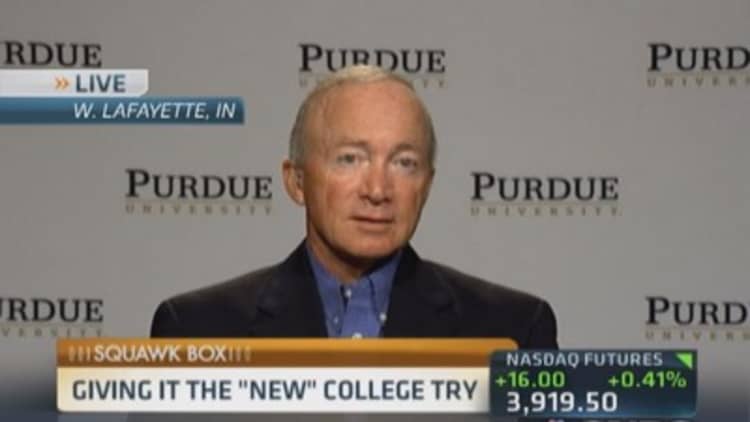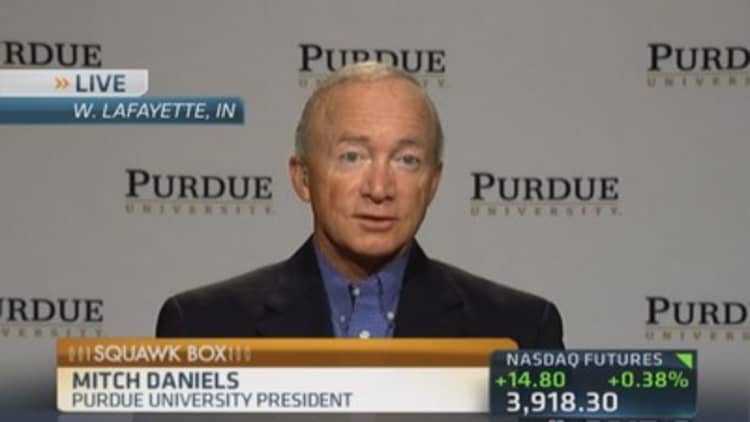
The seemingly "unlimited ability" of colleges to increase costs has "run its course" as a business model for higher education, Purdue University President Mitch Daniels told CNBC on Wednesday.
"A record percentage of this year's applicants did not attend their first-choice [schools], and cost was almost always the reason. So I do believe the market is finally beginning to speak," he said.
Daniels said on "Squawk Box" that he had made it his mission to try to rein in college costs when he took the job at Purdue in January 2013, after serving two terms as governor of Indiana and deciding not to seek the Republican nomination for president.
With student loan debt topping $1 trillion, he sought to keep college costs more under control by instituting a tuition freeze at Purdue that started in 2013. It's also in effect this year and at least through 2015.
"Let's try something different," Daniels said, "instead of asking our students' families to adjust their budgets to our spending, let's try to adjust our spending to their budgets for a while."
"People will say, 'Nothing has risen faster than the cost of health care except college tuition.' But nothing has risen faster than college tuition than college textbooks: three times inflation over the last decade," he said.

"The average student here at Purdue and other places are spending $1,200 or more a year on that now," he said. "It's the third-highest cost of college."
Daniels hopes a new co-branded Purdue Student Store on Amazon will help students save up to 30 percent, or $6 million a year, on textbooks.
On the issue of paying student athletes, the Purdue University president said, "There are lot of unintended consequences that could come to a system that is already suffering with wretched excess in money and overemphasis on sports."
On Friday, a federal judge ruled the NCAA cannot stop players from selling the rights to their names, images and likenesses. It struck down NCAA regulations that prohibit student-athletes from getting anything other than scholarships and the cost of admission.
The judge did say the NCAA could set a cap on the money paid to athletes, as long as it allows at least $5,000 per athlete per year of competition.
The NCAA said Monday it wants clarification on two points contained in the ruling—asking the judge which recruits are covered and when it starts. The college governing body plans to appeal at least part of the ruling.
Read MoreHow NCAA rich will stay richer: Two-tier economy
"I think this is [a] very troublesome development if it comes. I would point out there's an enormous value provided to student- athletes, the value of a scholarship and all the things that go with it—well up into six figures already," said Daniels—adding Purdue's student-athletes on average perform better academically than the student body at large. "And our athletic department pays for itself. We don't ask other students to subsidize it."
I took a vow of political celibacy.Mitch DanielsPurdue University president
Saying he took a vow of "political celibacy" when he signed on at Purdue, the onetime powerful voice in the Republican Party refused to make any predictions about the 2016 presidential race.
But Daniels did say he's still passionate about issues that impact the financial well-being of students and higher education such as "the national debt and the unconscionable transfer [of] income and wealth from young to old."
Federal funding of research is also suffering like all the discretionary programs under the weight of the sequester spending cuts because the "entitlement monster is eating the whole budget," he said.
—By CNBC's Matthew J. Belvedere. The Associated Press contributed to this report.


